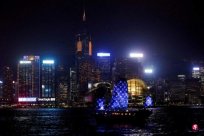
After the crown disease epidemic, the consumption of Hong Kong people went north to become a trend.I attended several meal in Hong Kong in the past week and found that the business of most restaurants was very deserted. The most exaggerated one of the two -thirds without guests, and the restaurant employees had more employees than diners.
The manager of a Japanese -style restaurant smiled bitterly that the consumption level in mainland China was low, and the Hong Kong dollar was strong. Many mature customers either change to the mainland for consumption or go directly to Japan to travel.The employees of another Chinese restaurant complained that the Hong Kong stock market has fallen sharply recently. Many shareholders have lost their desire for consumption. They want to tighten their pants and belts to live, lamenting that the business business is becoming more and more difficult to do.
In fact, the performance of Hong Kong stocks in the past year is indeed disappointing.What is worrying is that the decline of the Hang Seng Index in 2024 has not stopped, and it has fallen by 3%, 1.76%, and 5.8%in the first three weeks.By the fourth week, this week, Hong Kong stocks further fell 2.3%on Monday (January 22), which was the first time since October 2022 below 15,000 points.
Looking at the information, on the day of the return of Hong Kong on July 1, 1997, the Hang Seng Index closed at 16365 points.Vertically, this Monday Hang Seng Index closed at 14,961 points, which means that Hong Kong stocks returned to the basic point 26 years later, becoming a veritable "50 years unchanged."
From the horizontal view, Hong Kong stocks are also terrible than other places in other places.For example, the Taiwan stock market and the Hong Kong Hang Seng Index presented a "gold cross", and the first time in 31 years surpassed Hong Kong stocks.Of course, the index of Hong Kong and Taiwan stocks is calculated in two different methods, which is not accurate to put together.However, Taiwan stocks have continued to climb from 10,000 points to 18,000 points. Hong Kong, which was once the Asian Financial Center, has evaporated from more than 30,000 points and fell to the Taiwan stock index.Essence
In addition to the Hang Seng Index being surpassed by the Taiwan stock index, even Hong Kong's market value of the stock market has been surpassed by India.According to the World Exchange Federation (WFE) data, as of the end of November last year, the total market value of the Indian National Stock Exchange was US $ 3.989 trillion (S $ 5.35 trillion), surpassing Hong Kong's 3.984 trillion US dollars, and it became the seventh largest stock market in the world.
The performance of the Hong Kong stock market is weak, the most direct reason is related to the Hong Kong economy.The 2019 social movement and three -year epidemic hit Hong Kong.In the past year, the Hong Kong economy has recovered far after the epidemic.Taking the real estate market that has a great impact on the Hong Kong economy as an example, residential property prices have plummeted by more than 20%from its peak.Some real estate developers have launching first -hand real estate sales and liability ratio continued to be high. In the short term, they are facing increasing debt pressures, which has become a new source of risks in Hong Kong, which has also led to recent weak performance in Hong Kong stocks.
At the same time, the economic performance of mainland China is equally unsatisfactory. A series of economic data is poor, which has led to weak confidence in investors, continuing funds, dragging A shares, and affecting Hong Kong stocks.
TheHang Seng Index has been regarded as an important indicator of the Hong Kong stock market trend since its launch in 1969, consisting of the most representative blue -chip company.With more Chinese -funded enterprises listed in Hong Kong, in recent years, the Hang Seng Index has added more and more Chinese -funded stocks as its ingredients.For example, Tencent, who has become a "stock king" in recent years, is a member of the Hang Seng Index's ingredients in 2008.The ratio of Chinese -funded enterprises in the Hang Seng Index is increasing. The performance of these companies in the mainland market is good or bad, and they will affect the trend of Hong Kong stocks.
From a more macro perspective, the weak Hong Kong stock market is influenced by the slowdown of the mainland economy, and it is more important that Sino -US relations continue to be tense.The constant restrictions on the United States and targeting Chinese companies will also affect investors' willingness to enter the Hong Kong stocks.
Many funds that invest in international stocks in Europe and the United States have changed to tracking the benchmark index that does not include the China -Hong Kong stock market in the past year, and no longer invest in mainland China and Hong Kong markets.This means that foreign capital selling Hong Kong stocks is no longer a simple economic factors, but a disguise for political considerations.Hong Kong stocks have fallen again and again this year, and they have begun to become a crisis of confidence, and the funds flowing away will not easily return to the Hong Kong market.
Faced with the "falling down" of Hong Kong stocks, all sectors of Hong Kong society have recently made suggestions.For example, the New Democratic Party recommends that the Hong Kong Government uses foreign exchange funds to support Hong Kong stocks. The reason is that the Hong Kong stock market is weak. Once the person with unique care is sold sharply, the consequences are serious. The Hong Kong government must send a clear signal to the market to stabilize confidence.The party suggested that the official use of foreign exchange funds to increase a certain share, such as 5%to purchase high -quality Hong Kong stocks to boost market confidence.
However, people from Hong Kong's financial and gold industry generally pour cold water. They believe that although the entry of the Hong Kong government has a leading role, this move will also make the outside world feel that Hong Kong stocks are not available to rescue the Hong Kong government, but it is not good for market confidence.
In fact, the average daily turnover of Hong Kong stocks last year was approximately HK $ 100 billion (S $ 17.2 billion).If the New Democratic Party's proposal has increased 5%of the foreign exchange fund, it is only 200 billion Hong Kong dollars to enter the market.It can be seen that even if the Hong Kong government enters the market, it can only be entrusted for a while, not a long -term plan; Moreover, the current financial reserve of Hong Kong has plummeted and cannot rely too much on government support.
In any case, the current price -earnings ratio of the Hong Kong stock market has fallen by nearly eight times, which is a low level in the past 10 years. The continuous decline in Hong Kong stocks is obviously inconsistent with normal market laws.If the Chinese economy has gradually improved, and Beijing's launch of more stimulus measures, Hong Kong stocks should be able to see Shuguang soon.




